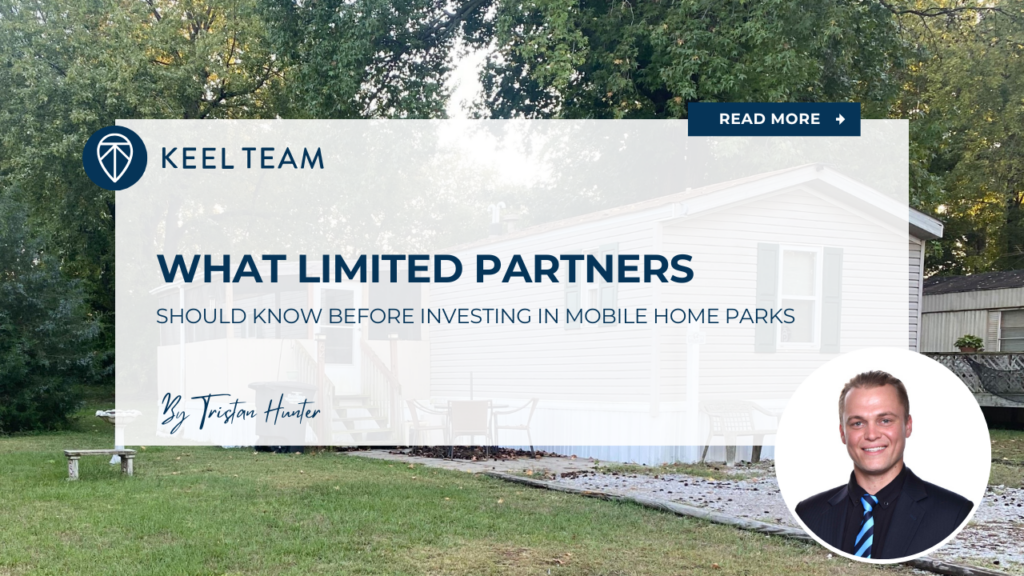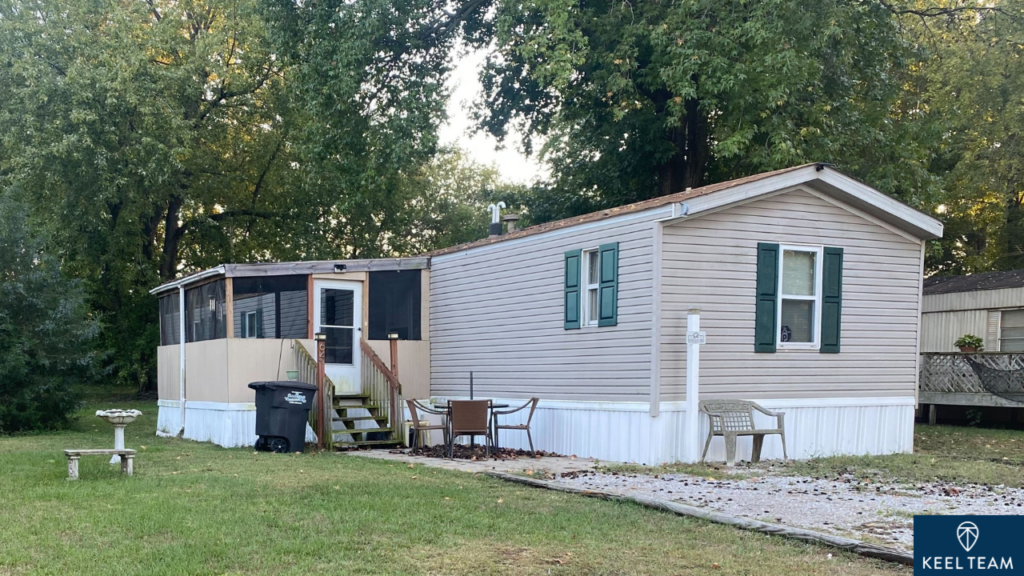What Limited Partners Should Know Before Investing in Mobile Home Parks
-
 Tristan Hunter - Investor Relations
Tristan Hunter - Investor Relations

Investing in mobile home parks offers unique opportunities, but limited partners (LPs) should consider several factors before committing. As a passive investor, understanding the dynamics of mobile home park syndications helps set realistic expectations and build stronger partnerships. While the returns can be attractive, it’s essential to know how these investments work and what to look out for.
Understand the Role of a Limited Partner
Limited partners primarily invest capital without engaging in daily operations. General partners (GPs) typically manage the mobile home park, handle renovations, and oversee tenant relations. LPs provide funding, share in profits, and have limited liability. This structure means limited partners rely heavily on the expertise and decisions of general partners.
Because the GP takes on most of the active responsibilities, it’s important for limited partners to choose trustworthy syndicators who communicate openly. When issues arise—whether with tenants or unexpected expenses—GPs are responsible for solving them. As a limited partner, your role involves staying informed and trusting the GP’s judgment.
Look for Syndicators with a Solid Track Record
Mobile home park investments thrive on effective management, and the syndicator’s experience plays a big role in a project’s outcome. It can help to ask for past performance data, including previous mobile home park deals, to assess how they managed risks, occupancy, and cash flow.
Though past success doesn’t guarantee future results, a track record of full-cycle deals offers some insight. Ask about previous renovations, rent increases, and how GPs handled tenant retention. Knowing how they have dealt with challenges in the past can make it easier to gauge their ability to manage the current investment.
Focus on Market Research and Location
Mobile home parks located in areas with high demand and limited affordable housing options may perform well. However, markets fluctuate, and no investment is without risk. Limited partners should review market data, including local job growth, rental demand, and housing trends, to understand if the location aligns with the investment’s goals.
In areas with stable demand for affordable housing, mobile home parks tend to maintain steady occupancy. But, even in promising locations, GPs must implement strategies to attract and retain tenants.
Download our FREE eBook on the Top 20 things to know BEFORE investing in mobile home parks!
Review the Business Plan Thoroughly
Each mobile home park investment includes a business plan, which outlines how the GP plans to add value and achieve returns. Limited partners should pay attention to key elements like:
- Planned renovations – What improvements will enhance tenant satisfaction?
- Projected lot rent increases – How much can rents realistically increase?
- Operational strategies – How will the GP manage vacancies and tenant turnover?
A well-structured business plan helps LPs understand the project’s timeline and cash flow expectations. Keep in mind, though, that projections are not guarantees. The real outcomes may differ based on various economic factors or unexpected maintenance issues.
Be Aware of Risk Factors
While mobile home park investments are considered more stable than other real estate asset classes, risks still exist. Some key risks to watch for include:
- Tenant default or non-payment – Even in affordable housing, financial hardships can impact tenant payments.
- Maintenance costs – Aging infrastructure may require more repairs than initially anticipated.
- Economic downturns – A weak job market can affect demand and revenue.
As a limited partner, it is essential to be comfortable with potential risks and how the GP plans to address them. Diversifying across multiple mobile home parks or syndications might reduce exposure to any single investment’s challenges.
Assess the Capital Structure
Understanding how the capital structure affects your returns is important. Syndications typically distribute profits through a waterfall structure, which outlines how profits will flow between GPs and LPs. Limited partners should look at:
- Preferred returns – This guarantees LPs receive a certain return before GPs take a share.
- Equity splits – Profits are divided according to a pre-set percentage between LPs and GPs.
Though preferred returns are not always a given, they offer LPs priority in cash flow distribution. Knowing the equity structure will give limited partners clarity on when they can expect returns and how much they might receive over time.
Pay Attention to the Deal’s Exit Strategy
Mobile home park investments typically span several years, and the exit strategy plays a role in final returns. General partners might plan to sell, refinance, or continue holding the mobile home park depending on market conditions. Limited partners typically benefit from understanding these exit plans early on.
If the strategy involves refinancing, LPs might receive their capital back while maintaining equity. If a sale is planned, LPs share in the profits based on their percentage of ownership. However, these outcomes are subject to market shifts, so flexibility may be needed if conditions change during the investment period.
Stay Informed on Communication Practices
Strong communication between GPs and LPs helps foster trust. Limited partners should know how often they will receive updates and what kind of information to expect. Typical updates include:
- Quarterly financial reports
- Occupancy rates and tenant updates
- Progress on renovations or other business plan milestones
Clear, consistent communication allows limited partners to stay connected without managing the day-to-day operations. Asking for sample reports before investing can give LPs a sense of how transparent and thorough the syndicator’s communication will be.

Understand the Importance of Tax Benefits
Investing in mobile home parks often comes with tax advantages, which can improve returns for LPs. Depreciation, for example, allows investors to offset taxable income. Some syndications also offer cost segregation studies to potentially accelerate depreciation and increase tax savings.
It’s helpful to consult a tax professional to understand how these benefits might apply to your situation. While these tax savings could improve returns, not every limited partner will experience the same benefits, as individual tax circumstances vary.
Prepare for the Long-Term Commitment
Mobile home park investments are usually illiquid, meaning you typically can’t easily access your capital until the project concludes. Limited partners should be prepared for a multi-year hold period, often ranging from five to ten years.
Due to mobile home parks requiring time to generate stable cash flow and complete value-add improvements, early returns may vary. Understanding this timeline helps limited partners set appropriate expectations and plan accordingly.
Final Thoughts
Investing in mobile home parks as a limited partner offers potential rewards, but it’s important to know what to expect. From assessing the syndicator’s track record to understanding risks and capital structures, each detail plays a role in making an informed decision.
Though no investment comes without risk, focusing on due diligence and aligning with experienced GPs can improve the chances of success. Staying informed throughout the process and maintaining open communication will also help LPs feel more secure in their investment journey.
Are you looking for MORE information? Book a 1-on-1 consultation with Andrew Keel to discuss:
- A mobile home park deal review
- Due diligence questions
- How to raise capital from investors
- Mistakes to avoid, and more!
Disclaimer:
The information provided is for informational purposes only and is not investment advice or a guarantee of any kind. We do not guarantee profitability. Make investment decisions based on your own research and consult registered financial and legal professionals. We are not registered financial or legal professionals and do not provide personalized investment recommendations.

Tristan Hunter - Investor Relations
View The Previous or Next Post
Subscribe Below 👇





